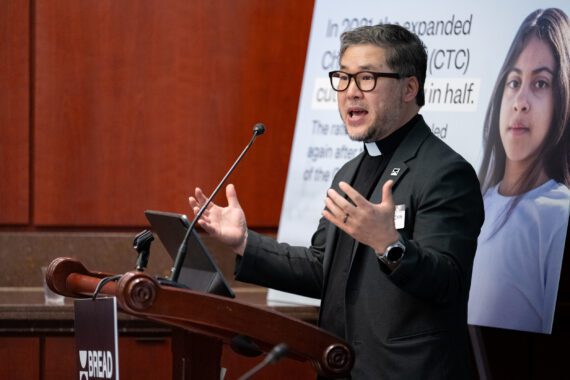By Stephen H. Padre
Yesterday, October 16, was World Food Day. It was also the annual Bread for the World Sunday. Both commemorations are a time to give thanks for the abundance God provides for us in food resources and to rededicate ourselves to our efforts of making sure every person on earth has access to enough food and nutrition to live a healthy and active life.
The Gospel lesson read in many churches that use the Revised Common Lectionary was Jesus’ telling of The Parable of the Widow and the Unjust Judge. There are a couple of notable things about this parable:
- On one side is a widow. In biblical times, widows had a low status. Since women were considered property, they had to be supported by a man in order to survive. A widow could live with her son and his wife or with her in-laws. Otherwise, she was in a vulnerable situation. But we know from many parts of the Bible that God has special concern for particular groups of people – widows, orphans, the sick, the hungry – people on the margins, in other words. God wants us to care for them and restore them back to their place in society as thriving citizens.
- The widow was persistent. We learn from this passage that the judge doesn’t change his views but gives in “because this widow keeps bothering me.” He doesn’t want the widow to wear him out. Jesus points to this as the key to the parable. It’s the widow’s persistence that caused the breakthrough.
We know that God doesn’t answer every one of our prayers and that God doesn’t always give us what we want. But surely it’s in the heart of God to see that people who are hungry are fed. If we raise up our concern for hungry people, which is also God’s concern, and if we persist in our prayers and actions toward the end of hunger in God’s world, then God will hear our cries and answer our prayers.
But what if we look at this parable a different way? What if the judge is the federal government? What if we’re persistent in our cries for an end to hunger to Congress? Perhaps if we make phone calls, send emails and letters, and make visits to our representatives, then they would feel worn down and give in. Maybe if enough of us did that, together as Bread for the World, then Congress would do what’s in its power to end hunger in our country and the world.
The Epistle for yesterday – Paul’s second letter to Timothy – also talks about persistence. Paul writes: “Proclaim the message; be persistent whether the time is favorable or unfavorable; convince, rebuke, and encourage.” We have a message for Congress about hunger, and the time is favorable. The nations of the world are making great strides in ending hunger. Since 1990, the world has cut extreme poverty in half. And in 1960, 1 in 3 people was hungry. Today, chronic hunger affects many fewer people – 1 in every 8 or 9.
So let us persist in our prayers and work to end hunger on World Food Day, Bread for the World Sunday, and every day until hunger ends, once and for all.
Stephen H. Padre is the managing editor in Bread’s communications department.
Photo: A Russian Orthodox depiction (c. 1881) of the persistent widow in the Gospel reading for Oct. 16. From Wikimedia.



